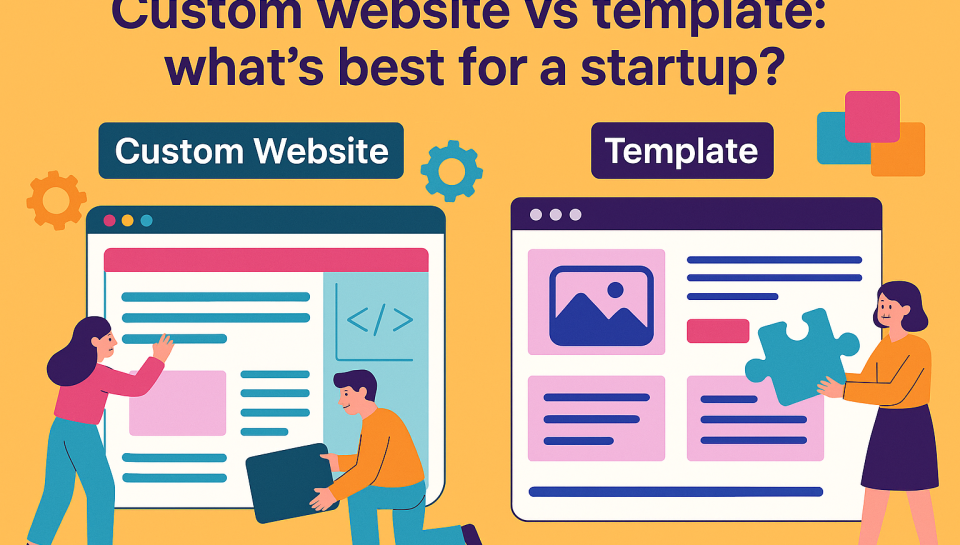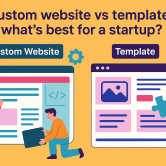Custom Website vs Template: What’s Best for Your Startup?

Starting a business comes with countless decisions, and choosing the right website approach is one of the most critical early choices you’ll make. Your website serves as your digital storefront, first impression, and often the primary way customers discover and interact with your brand. With 71% of small businesses now having a website presence, the question isn’t whether you need one—it’s whether you should invest in a custom-built solution or leverage a pre-designed template.
This comprehensive guide will help you navigate the custom website versus template debate, providing you with the insights needed to make an informed decision that aligns with your startup’s goals, budget, and timeline.
The Problem: Choosing the Wrong Website Foundation Can Cost Your Startup Dearly
Many startups struggle with website decisions because they lack clarity on what approach best serves their unique needs. This confusion leads to common costly mistakes:
Time and Resource Misallocation: Startups often either overspend on unnecessary custom features or underinvest in their digital presence, missing crucial opportunities for growth.
Poor User Experience: Without proper planning, businesses end up with websites that don’t convert visitors into customers, regardless of whether they’re custom or template-based.
Scalability Issues: Many startups choose solutions that work initially but become limiting factors as the business grows, requiring expensive rebuilds later.
Brand Inconsistency: Misaligned website choices can create disconnect between a startup’s vision and its digital representation, confusing potential customers.
The stakes are high—Adobe research shows that 38% of people will stop engaging with a website if the content or layout is unattractive, making your initial website decision crucial for long-term success.
The Solution: A Strategic Framework for Website Decision-Making
Understanding Custom Websites
Custom websites are built from scratch, tailored specifically to your business needs, brand identity, and functional requirements. Every element—from design to functionality—is crafted uniquely for your startup.
Key Characteristics of Custom Websites:
- Unique design reflecting your brand identity
- Tailored functionality specific to your business needs
- Complete control over user experience and customer journey
- Scalable architecture that grows with your business
- Integration capabilities with existing business systems
Understanding Template-Based Websites
Template websites use pre-designed frameworks that you can customize with your content, colors, and branding. Popular platforms include WordPress themes, Squarespace templates, and Shopify themes.
Key Characteristics of Template Websites:
- Pre-built design structures with customization options
- Faster deployment and lower initial costs
- Built-in responsive design and basic SEO features
- Regular updates and security patches from platform providers
- Community support and extensive documentation
The Strategic Decision Framework
1. Budget Analysis
Template Approach:
- Initial costs: $100-$500 for premium templates
- Monthly hosting/platform fees: $10-$50
- Total first-year investment: $500-$1,200
Custom Approach:
- Development costs: $5,000-$50,000+ depending on complexity
- Ongoing maintenance: $500-$2,000 annually
- Total first-year investment: $6,000-$55,000+
2. Timeline Considerations
Template Implementation:
- Setup time: 1-4 weeks
- Content population: 1-2 weeks
- Launch ready: 2-6 weeks total
Custom Development:
- Planning and design: 2-4 weeks
- Development phase: 6-16 weeks
- Testing and refinement: 2-4 weeks
- Total timeline: 10-24 weeks
3. Functionality Requirements Assessment
When Templates Excel:
- Standard business websites with common features
- E-commerce stores with basic selling needs
- Service-based businesses requiring appointment booking
- Content-heavy sites like blogs or portfolios
When Custom Development is Necessary:
- Complex user portals or membership systems
- Advanced e-commerce with unique selling processes
- Integration with proprietary business systems
- Innovative features that don’t exist in templates
4. Scalability Planning
Template Scalability: Templates can handle significant growth but may require platform migrations or extensive customization as needs become more complex. Most successful small to medium businesses operate effectively on template-based solutions.
Custom Scalability: Custom websites are built with your specific growth trajectory in mind, making them inherently more scalable for businesses with unique or rapidly evolving requirements.
Making the Right Choice: Decision Matrix
| Factor | Choose Template When | Choose Custom When |
|---|---|---|
| Budget | Under $5,000 available | $10,000+ budget available |
| Timeline | Need to launch within 6 weeks | Can wait 3+ months for launch |
| Features | Standard functionality sufficient | Unique features required |
| Team | Limited technical expertise | Have development resources |
| Industry | Service/content-based business | Complex product/platform business |
Evidence: Data-Driven Insights on Website Approaches
Recent industry research provides compelling evidence about website approach effectiveness:
Cost-Effectiveness Data: According to Web.com’s 2023 Small Business Website Study, 67% of small businesses using template-based solutions reported satisfaction with their initial investment, while custom website owners showed 23% higher long-term satisfaction rates but required 4x higher initial investment. This suggests that template satisfaction is high initially, but custom solutions provide better long-term value for businesses that can afford the upfront investment.
Performance Metrics: Google’s Core Web Vitals data from 2023 shows that well-optimized template websites perform comparably to custom sites in loading speed and user experience metrics. However, custom websites scored 15% higher in unique user engagement metrics, suggesting that tailored user experiences do impact visitor behavior. The key finding is that both approaches can achieve excellent technical performance when properly implemented.
Business Growth Correlation: A 2023 survey by Clutch revealed that startups using custom websites reported 31% faster revenue growth in their second year compared to those using templates. However, this correlation doesn’t account for the fact that businesses investing in custom websites typically have larger initial budgets and more aggressive growth strategies. The data suggests that website choice should align with overall business investment strategy rather than being viewed as a standalone growth driver.
Benefits: Why the Right Choice Accelerates Startup Success
Benefits of Template-Based Approaches
Rapid Market Entry: Templates enable you to establish your digital presence quickly, allowing you to start collecting leads, making sales, and gathering user feedback while competitors are still in development phases.
Cost-Effective Experimentation: Lower initial investment means you can test different messaging, offerings, and market approaches without significant financial risk, pivoting your online presence as you learn about your customers.
Professional Appearance: Modern templates are designed by professionals and tested across thousands of implementations, ensuring your startup looks credible and trustworthy from day one.
Built-in Best Practices: Templates incorporate proven conversion optimization techniques, mobile responsiveness, and SEO fundamentals, giving your startup a strong foundation without requiring expertise in these areas.
Benefits of Custom Development
Competitive Differentiation: A unique website helps your startup stand out in crowded markets, creating memorable experiences that competitors using similar templates cannot replicate.
Optimized Conversion Funnels: Every element can be designed specifically for your customer journey, potentially increasing conversion rates and customer lifetime value significantly.
Scalable Architecture: Custom websites grow seamlessly with your business, avoiding the costs and disruptions of platform migrations or major rebuilds as you expand.
Brand Cohesion: Complete design control ensures your website perfectly reflects your brand identity, building stronger brand recognition and customer trust.
The Hybrid Approach: Best of Both Worlds
Many successful startups begin with high-quality templates and gradually invest in custom features as their needs and budgets grow. This approach offers:
- Immediate market presence with manageable costs
- Learning opportunities about customer behavior and preferences
- Gradual investment in custom features that prove most valuable
- Risk mitigation through incremental improvements rather than large upfront bets







